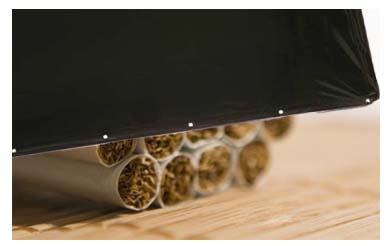Health
Government ban on cigarette displays in shops may fail legal test, QC tells trade
 A flagship government anti-smoking scheme that would ban Britain’s shops from displaying cigarettes would be “unenforceable”, according to one of the country’s leading QCs.
A flagship government anti-smoking scheme that would ban Britain’s shops from displaying cigarettes would be “unenforceable”, according to one of the country’s leading QCs.
The plan to prevent shops from selling tobacco products unless they are kept entirely out of sight of customers is due to be debated and voted on by MPs today.
With critics saying that the proposal threatens to drive thousands of small corner shops out of business, a backbench rebellion is expected, with as many as one in ten Labour MPs set to vote against the scheme, which is backed by the Government.
However, in advice drawn up for the Tobacco Manufacturers’ Association (TMA), Lord Pannick, QC, has raised the prospect of a legal challenge. In his advice, he claims that even if the legislation was passed, it would not carry any legal weight because the Government has failed to give proper notification of its intentions to the European Commission before placing the Bill before Parliament.
Lord Pannick claims that there is a “strongly arguable” case that, if passed, the new rules, which are contained in the UK Health Bill, would be unenforceable.
The Department of Health believes that evidence from Canada, where a ban on displaying cigarettes already exists, shows that the step will help to reduce the number of people who smoke and will make it easier for smokers to give up the habit. The department also argues that the ban, which could not come into effect before 2013, would help to protect young people from smoking by shielding them from the displays and tobacco advertising in convenience stores.
However, Lord Pannick, whose past clients have included the Queen and the Commissioner of the Metropolitan Police, said that the Government should delay enactment of the Bill for three months in order first to formally inform Brussels of its proposals before putting legislation before MPs. Failure to do so could open an opportunity for the tobacco industry to mount a legal challenge.
Ash, the anti-smoking campaign, rejected Lord Pannick’s claims. A spokeswoman said: “There is no reason why the European Commission needs to be notified in this instance.” She also questioned whether a ban on cigarette displays would hurt small shops, without worrying supermarkets, with their greater space for keeping cigarettes out of sight, and illicit tobacco traders, as the tobacco industry has argued.
The Ash spokeswoman claimed that in the Republic of Ireland, where a ban was introduced in July, small shops have actually benefited because they have been able to give greater prominence to the display of higher-margin merchandise where they had once placed relatively unprofitable and highly taxed cigarettes.
James Lowman, chief executive of the Association of Convenience Stores (ACS), criticised the proposed ban as a “policy gimmick” that would impose unnecessary costs and disruption on retailers. He said: “The evidence that this will actually stop young people smoking just isn’t there.”
Mr Lowman also said that there was not enough detail available to MPs about how the regulations would work for there to be proper debate. “MPs will be unable to form a judgment on the cost of new equipment, store refits or the impact on staff, serving times and security,” he said. “ACS has made a detailed case to the Department of Health that these costs are likely to be substantial.”
Other controversial clauses in the Bill are likely to stoke debate. It also contains a plan designed to cut under-age smoking by restricting access to pub vending machines.
The Government’s existing proposal would force bar staff to check the age of people wanting to buy cigarettes before operating the vending machine by remote control. Many pub operators believe that this is impractical, particularly at busy times when staff are serving customers at the bar.
Smoky issue
• Ireland, Iceland and Canada have introduced cigarette display bans in stores
• Britain could be next, but not without a tough fight with the tobacco industry
• Philip Morris, the American maker of Marlboro and Chesterfield, is preparing legal action against the Irish Government, which introduced the ban at the end of June
• The proposed UK rules, which will be debated by MPs today, would make it illegal to display cigarettes in British supermarkets from 2011, followed by smaller shops in 2013
• In 2007, Alan Johnson, then Health Secretary, said that the ban would help to reduce the 87,000 deaths a year caused by smoking in England and protect the 200,000 children aged 11 to 15 who were regular smokers
• Tobacco companies and some retailers say that the law will simply provide a boost for cigarette smugglers and counterfeiters and will do nothing to stop people from smoking
• The Tobacco Retailers Alliance of small shopkeepers also claims that the change would cost them up to £5,000 each and that one in ten would be forced to close.
(Published by Times Online - October 13, 2009)